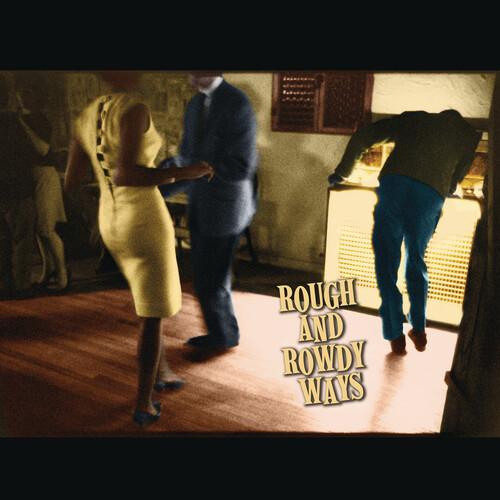By age 79, most musicians are either dead, retired, or content to just play the hits. Most musicians are not Bob Dylan. Not only is he still producing new material, but he’s actually getting better. His 39th studio album, Rough and Rowdy Ways, is a late-career triumph, one that would be unexpected were it not part of a hot streak that Dylan has been on since the mid-1990s. It is, like most of Dylan’s work, nostalgic and playful, but it is uncommonly timely, and although Dylan continues to set his gaze backwards, Rough and Rowdy Ways makes us want to ask him what lies ahead.
The first thing you might notice is Dylan’s voice. A lot of hay has been made about his gravelly rasp, and for good reason. His last album or original material, 2012’s Tempest, saw him in full fire-and-brimstone mode, especially on “Pay in Blood,” his scariest song by far. After Tempest, Dylan took a radical departure, releasing three albums – totaling fifty songs – of old standards, most of which were made famous by Frank Sinatra. Far from being a vanity project, we can see now the reason behind recording and releasing those albums: Dylan was teaching himself to sing again. His voice on RAWR is sublime: effortlessly charismatic, world-weary, lovelorn, apocalyptic and exuberant. Dylan brings a certain persona to each of his albums, but this might be one of his most successful.
The second thing to note about RAWR is its production. Produced by Dylan (under his usual pseudonym Jack Frost), this album is uncommonly inviting. Dylan typically favorites a more stripped-down, drier sound (he butted heads with producer Daniel Lanois over the latter’s insistence on a murky, swampy sound for 1989’s Oh Mercy), but here he fights against that and wins. The spaces here feel open, the strings resonant; producing his three bare-bones standards albums really taught Dylan to push his limits as a producer. “I Contain Multitudes” and “Murder Most Foul,” which bookend the album, are classic examples of how to make a lush soundscape with a small ensemble, but for my money, Dylan’s greatest triumph as a producer is in the lovely “I’ve Made Up My Mind to Give Myself to You.” Buoyed by light, tropical guitars, the song is given a sense of winterly comfort by a chorus Ooo-ing and Mmm-ing. Picture Bing Crosby drinking a daiquiri and you’ll get the idea of what it sounds like.
The songs, to put it plainly, are some of the best Dylan has ever written. The three singles released ahead of the album – “I Contain Multitudes,” “False Prophet,” and “Murder Most Foul” – are all stunning displays of lyricism and musicianship, with the latter becoming an instant classic (and Dylan’s first No. 1). Going into RAWR blind, as you must, will astonish you. “My Own Version of You” is the album’s standout, another classic and maybe the best song Dylan’s written since “Mississippi.” Telling a humorous story of a Dr. Frankenstein type, Dylan makes you wonder if he’s having a lark, or if he’s talking about himself, or his songs. Like a lot of Dylan’s songs, there’s always the chance that it’s about him, no matter how deliberately obfuscating the lyrics (on “Goodbye Jimmy Reed,” Dylan cheekily quips, “I can’t sing a song I don’t understand”).
There is the kaleidoscopic cast of characters one comes to expect from a Dylan album these days, and it’s a welcome return. No other artist could release an album featuring appearances from Liberace, St. John, Karl Marx, Sigmund Freud, not to mention the nonstop litany of songs and artists found in “Murder Most Foul.” (The title itself is a reference, too, to Jimmie Rodgers’ obscure 1935 release My Rough and Rowdy Ways. Dylan once covered Rodgers’ “Miss the Mississippi.” Everything really is circular with him.) But this isn’t just Dylan on autopilot. Here, as in 1997’s landmark Time Out of Mind, Dylan bluntly confront his mortality, while joking about his immortality. “I don’t recall when I was born,” he sings on “False Prophet,” “and I forgot when I died.”
“Black Rider,” which plays as a kind of sequel or rebuttal to Oh Mercy‘s standout “The Man in the Long Black Coat,” casts Death as a kind of tragic, almost pathetic figure, one Dylan no longer fears. Instead he almost pities him, lamenting plainly, “You’ve been on the job far too long.” It’s on “I’ve Made Up My Mind” that Dylan speaks as plainly as we’ve heard him in years. To hear him at this level of romantic and yearning, you’d have to go back to “Stay With Me” (from 2015’s Shadows in the Night), or, if you want to only look at his original output, to “Make You Feel My Love,” from Time Out of Mind. The love, this song tells us, never left Dylan, nor has its effect been diminished. It plays like a paean to an unnamed woman, or the open road, or his fans, or life itself. Like the man says, he contains multitudes.
There was some controversy in 2016, when Dylan was awarded the Nobel Prize for Fiction, making him the first (and so far only) lyricist to be honored in such a way. But he’s been making a case for himself as a writer for fifty years now. Rough and Rowdy Ways is full of Dylan’s trademark fabulism, but also peppered throughout with surprising vulnerability and honesty. It’s not so much that Dylan is back; this album proves he never left, and probably never will.

